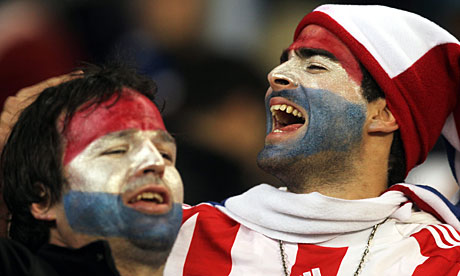
South American teams have players based in Europe and a tough qualifying competition but an easy draw never hurts

Shortly after Paraguay had put Japan – and everyone else at Loftus Versfeld – out of their misery last night, their manager, Gerardo Martino, warned: "South America is peaking. We have so many in the last eight." It was not quite up there with Colin Welland proclaiming "The British are coming" after Chariots of Fire swept the Oscars in 1981 but his comments carry greater resonance.
So far in this World Cup South American teams have won 12 of 18 matches against sides from other federations, with five draws and one defeat. Remarkably, of the five Conmebol teams that qualified four have made it to the quarters (only Chile, knocked out by Brazil, have fallen by the wayside) and there are plenty of theories as to why.
One common explanation is that more South Americans are playing in Europe than ever before – which has welded broad experience and improved physicality to natural home-grown technique. According to Uruguay's Edinson Cavani: "Nowadays there are many players from Chile, Paraguay and Uruguay who all play at the highest level in Europe and elsewhere. When they meet up all that fuses together to make a strong national team."
Has this been a factor in South Africa? It is hard to say – although it is true that there are more Europe-based South Americans in this World Cup. In Germany the average was 12 players per squad, now it is just under 15.
Another theory, articulated by the Argentina manager, Diego Maradona, is that: "The South American qualifiers are much more competitive than in Europe." This argument has instinctive appeal. Over two years every South American country faces each other, home and away, over 18 matches. There are no Liechtensteins or San Marinos from whom to take easy points.
The bottom-placed team in Conmebol's 10-team qualifying group for 2010 were Peru – who drew with Brazil and Argentina and are ranked 53rd in the world by Fifa. England qualified for South Africa after 10 group matches against Kazakhstan, Belarus, Andorra, Croatia and Ukraine. Only the last two are ranked in the world's top 75.
Others argue that South American qualifying also forges mental toughness. Players based in Europe must travel thousands of miles every couple of months and must adapt to widely differing conditions. As Mario Andrade, a commercial manager for Nike in the region, puts it: "In Europe you have impeccable referees and pitches and little hardship. In South America there's often longer travel, worse pitches, lousier referees and sometimes altitude, which toughens players up. After that, spending five weeks in a nice hotel for the World Cup is easy."
The Uruguay manager, Oscar Tabárez, agrees: "The qualifying round is long suffering and the World Cup is a joy."
There may, however, be a more simple explanation: in the past four years, sides such as Chile and Uruguay have climbed Fifa's rankings, aided by stronger squads and tactically astute managers.
The World Cup has merely alerted the rest of the world. As Martino puts it: "The South American teams arrived very well prepared at this World Cup. Apart from having great individuals they came here in their best moment as teams." Luck has also played a part, with Uruguay drawn with a France squad at war with itself and Paraguay with an ageing Italy team.
It should be pointed out that while the South American teams have an impressive record at this World Cup, none have beaten a higher-ranked side. Uruguay, ranked 16th, drew with France (9th) and beat Mexico (17th), South Africa (83rd) and South Korea (47th). Paraguay, 31st, drew with Italy (5th), beat Slovakia (34th) and drew with New Zealand (78th) and Japan (45th). Chile, ranked 18th, beat Switzerland (24th) and Honduras (38th).
Perhaps we should be careful of drawing sweeping conclusions from such a small sample of data, just as we were when six European teams made the quarter-finals in Germany. What we are seeing in 2010 may be a blip. For now, however, Martino and his compatriots are right to revel in their achievements.
- Octopus Paul v Ahmadinejad [28/07]
- France suspend entire World Cup squ [24/07]
- Webb says World Cup final was taint [23/07]
- Goal-line technology off Fifa agend [20/07]
- World Cup final ball sold for £48K [18/07]
- Evra 'is being victimised', says Fe [17/07]
- Scolari says no offer yet to coach [16/07]
- Beckham: England players must take [15/07]
- Messi says WCup loss left him with [15/07]
- Now it's Brazil's turn to get ready [15/07]
| Years | Winners | Runner-up | Third place |
| 2006 | Italy | France | Germany |
| 2002 | Brazil | Germany | Turkey |
| 1998 | France | Brazil | Croatia |
| 1994 | Brazil | Italy | Sweden |
| 1990 | Germany | Argentina | Italy |
| 1986 | Argentina | Germany | France |
| 1982 | Italy | Germany | Poland |
| 1978 | Argentina | Holland | Brazil |
| 1974 | Germany | Holland | Poland |
| 1970 | Brazil | Italy | Germany |
| 1966 | England | Germany | Portugal |
| 1962 | Brazil | Czech | Chile |
| 1958 | Brazil | Sweden | France |
| 1954 | Germany | Hungary | Austria |
| 1950 | Uruguay | Brazil | Sweden |
| 1938 | Italy | Hungary | Brazil |
| 1934 | Italy | Czech | Germany |
| 1930 | Uruguay | Argentina | America |


